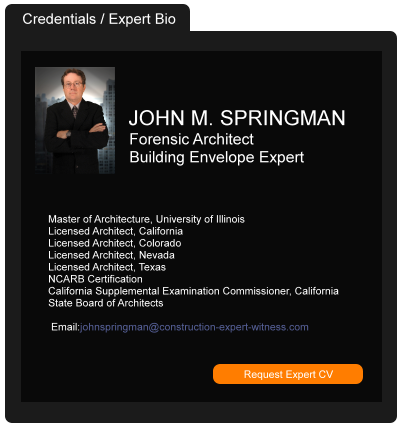World Green Building Council Calls for Net-Zero Embodied Carbon in Buildings by 2050
November 18, 2019 —
Nadine M. Post - Engineering News-RecordThe World Green Building Council’s latest maneuver in its war against greenhouse gas emissions is a rallying cry for embodied-carbon reduction in buildings that involves global collaboration, communication, education, innovation and regulation. WGBC’s ambitious aim is to get to net-zero EC in all new construction and renovations by 2050.
Reprinted courtesy of
Nadine M. Post, Engineering News-Record
Ms. Post may be contacted at postn@enr.com
Read the full story... Read the court decisionRead the full story...Reprinted courtesy of
Water Bond Would Authorize $7.5 Billion for California Water Supply Infrastructure Projects
October 29, 2014 —
Garret Murai – California Construction Law BlogWhen California voters cast their votes on November 4, 2014 they will decide the fate of a $7.5 billion water bond proposal – Proposition 1 – which would authorize $7.12 billion in new general obligation bonds and reallocate $425 million in previously authorized but unissued bonds for water supply infrastructure projects.
Proposition 1 – The Water Quality, Supply and Infrastructure Improvement Act of 2014
If you live in California you know that the state is in the midst of its third straight year of drought.
And it’s no ordinary drought.
According to some, it’s the severest drought on record, as nearly the entire state experiences “severe” to “exceptional” drought conditions across its counties.
The California Water Resources Board has implemented emergency water conservation regulations including hefty fines for those who don’t comply and even Governor Brown has allowed the grounds of the State Capitol to go brown to underscore the severity of the situation.
Read the court decisionRead the full story...Reprinted courtesy of
Garret Murai, Kronick Moskovitz Tiedemann & GirardMr. Murai may be contacted at
gmurai@kmtg.com
How Artificial Intelligence Can Transform Construction
February 22, 2021 —
Jeff Rubenstone - Engineering News-RecordArtificial intelligence and machine-learning algorithms have struggled to make sense of chaotic construction jobsites, but recent years have seen industry firms build the vast data lakes and analytics systems necessary for these machines to provide useful advice on how to plan, schedule and execute projects. In some cases, these AI advisors have become a standard part of some firms’ project delivery methods. But it’s still a challenge to convince construction professionals to listen to these AI advisors, and there are emerging questions of how risk will be allocated once algorithm-driven decisions start to steer projects.
Reprinted courtesy of
Jeff Rubenstone, Engineering News-Record
Mr. Rubenstone may be contacted at rubenstonej@enr.com
Read the full story... Read the court decisionRead the full story...Reprinted courtesy of
Malerie Anderson Named to D Magazine’s 2023 Best Lawyers Under 40
January 17, 2023 —
Malerie Anderson - Lewis Brisbois NewsroomDallas, Texas (January 12, 2023) - Dallas Partner Malerie T. Anderson has been named to D Magazine’s 2023 Best Lawyers Under 40 list for Business/Commercial Litigation. This is her second year appearing on this list.
According to D Magazine, the attorneys on its Best Lawyers Under 40 list are representative of up-and-coming attorneys in Dallas, who are nominated by their peers outside their own firm. The magazine asks nominating lawyers to think about “which lawyers under 40, of those whose work you have witnessed firsthand, would you rank among the current best?”
Ms. Anderson regularly advises business entities, real estate brokers, and licensed real estate agents to prevent litigation and defends against claims of all kinds, including breach of fiduciary duty and breach of contract claims. Her experience handling various disputes has led her to work closely with clients to develop and implement procedures to avoid future litigation.
Read the court decisionRead the full story...Reprinted courtesy of
Malerie Anderson, Lewis BrisboisMs. Anderson may be contacted at
Malerie.Anderson@lewisbrisbois.com
California Complex Civil Litigation Superior Court Panels
December 31, 2014 —
Richard H. Glucksman, Esq., Jon A. Turigliatto, Esq., and David A. Napper, Esq. – Chapman Glucksman Dean Roeb & Barger BulletinThe Complex Civil Litigation Program is relatively new as it has only existed in California
since 2000. Complex divisions dedicate courtrooms solely for litigation of complex civil
cases that require exceptional judicial management including construction defects, antitrust,
securities, toxic torts, mass torts, and class actions. Complex civil courtrooms help the trial
court operate in a more efficient, expeditious, and effective manner. A complex court
reduces costs for litigants by streamlining motion practice and expeditiously resolving
discovery disputes.
Not all counties have dedicated complex civil divisions. For those that do, each county has
its own local rules, and some complex divisions have their own particular set of rules. The
Judicial management of complex cases begins early, and is applied continuously and actively
with the idea that final resolution be expedited as much as possible. In focusing on
cooperation amongst the parties to achieve these goals, often requiring joint statements to
the court and a prohibition on discovery motions until after the parties have formally metand-
conferred on the issues. Moreover, complex cases are centralized and are assigned to
one highly skilled Judge for all purposes.
The first six California counties to create a Complex Civil division include Alameda, Contra
Costa, Los Angeles, Orange, San Francisco, and Santa Clara. Riverside County Superior
Court is the most recent California County to add a Complex division, effective January 2015.
Riverside county Superior Court’s Complex department consists of ten civil judges, seven of
which are in the main courthouse with Riverside. Riverside county expects to consolidate all
complex civil litigation into one courtroom by January 2015. Riverside county Judge Sharon
Waters state that "[i]t's been something that I personally have felt has been long overdue"
and that "[t]he idea is that put it with one judge and let him or her develop the expertise."
Judge Waters believes "[t]he potential value of establishing a complex litigation courtroom
[is that] it allows the judge to focus on the cases full time."1
As of October 2014, Riverside county had about 450 to 500 pending cases designated as
complex, over fifty percent (50%) of which involved construction defect matters. The sole
Judge who will preside over the complex cases has not yet been named.
1 Jolly, Vik. "Riverside to Shift Complex Civil Cases to 1 Courtroom." Los Angeles Daily Journal (October 13,
2014)
Reprinted courtesy of Chapman Glucksman Dean Roeb & Barger attorneys
Richard H. Glucksman,
Jon A. Turigliatto and
David A. Napper
Mr. Glucksman may be contacted at rglucksman@cgdrblaw.com;
Mr. Turigliatto may be contacted at jturigliatto@cgdrblaw.com;
and Mr. Napper may be contacted at dnapper@cgdrblaw.com
Read the court decisionRead the full story...Reprinted courtesy of
Colorado Temporarily Requires Employers to Provide Sick Leave While Awaiting COVID-19 Testing
April 06, 2020 —
Shawna Ruetz - The Grindstone Lewis Brisbois Labor & Employment BlogOn March 11, 2020, the Colorado Department of Labor and Employment (CDLE) issued emergency rules, referred to as Colorado Health Emergency Leave with Pay (Colorado HELP) Rules, requiring employers in certain industries to provide four days of paid sick leave to employees with flu-like symptoms while awaiting test results for COVID-19, or to anyone who is under instructions from a healthcare provider to quarantine or isolate due to a risk of having COVID-19. These rules take effect immediately for 30 days, or longer if the state of emergency declared by Colorado Governor Polis continues.
Which industries are covered by the Colorado HELP Rules?
- Leisure and hospitality;
- Food services;
- Child care;
- Education (including transportation, food service, and related work at educational establishments);
- Home health (if working with elderly, disabled, ill, or otherwise high-risk individuals)
- Nursing homes; and
- Community living facilities; and
- Retail establishments that sell groceries (added March 26).
How much paid sick leave must be provided?
Employers are required to provide up to four days of paid sick leave to employees with flu-like symptoms who are being tested for COVID-19. If the employee tests negative, the leave ends.
Read the court decisionRead the full story...Reprinted courtesy of
Shawna Ruetz, Lewis BrisboisMs. Ruetz may be contacted at
Shawna.Ruetz@lewisbrisbois.com
Best Lawyers Honors Hundreds of Lewis Brisbois Attorneys, Names Four Partners ‘Lawyers of the Year’
September 16, 2024 —
Lewis Brisbois Newsroom(August 15, 2024) - Best Lawyers has selected 171 Lewis Brisbois attorneys across 47 offices for its 31st edition of The Best Lawyers in America. It has also recognized four Lewis Brisbois partners on its "Lawyers of the Year" list: San Diego Partner Gary K. Brucker Jr. (Litigation - Real Estate); Weirton Managing Partner Michelle L. Gorman (Mass Tort Litigation/Class Actions - Defendants); Roanoke Partner Paul C. Kuhnel (Medical Malpractice Law - Defendants); and Los Angeles Co-Administrative Partner Steven R. Lewis (Product Liability Litigation - Defendants).
Please join us in congratulating the following attorneys on their Best Lawyers recognition! You can see the full list of attorneys named to Best Lawyers' Ones to Watch in America
here.
Read the court decisionRead the full story...Reprinted courtesy of
Lewis Brisbois
California Expands on Scope of Coverage for Soft Cost Claims
February 14, 2023 —
Caitlin N. Rabiyan - Saxe Doernberger & Vita, P.C.The California federal district court case of KB Home v. Illinois Union Insurance Co., No. 8:20-cv-00278-JLS-JDE, (C.D. Cal. August 23, 2022), provides much needed guidance for cases involving builder's risk insurance claims for soft cost coverage.
The case stems from damage to several of KB Home’s residential building sites caused by a severe rainstorm in January 2017. Each home site was a smaller part of a large housing development project. The damage caused significant delay in the completion of some individual home sites, although there was limited evidence of delay to the overall housing development project.
As a result, KB Home sought coverage under a builder’s risk policy purchased from Illinois Union for both hard costs and soft costs. “Hard costs” are the costs directly associated with repairing property damage to the sites. Conversely, “soft costs” are indirect expenses associated with project delays caused by such property damage and repair efforts. For example, hard costs would include labor and materials, whereas the soft costs claimed by KB Home included additional real estate taxes, construction loan interest, and advertising and promotional expenses incurred because of the delays. Illinois Union paid the claim for the hard costs, but denied the soft costs claim. KB Home filed suit and Illinois Union eventually filed a motion for summary judgment.
Read the court decisionRead the full story...Reprinted courtesy of
Caitlin N. Rabiyan, Saxe Doernberger & Vita, P.C.Ms. Rabiyan may be contacted at
CRabiyan@sdvlaw.com


































































